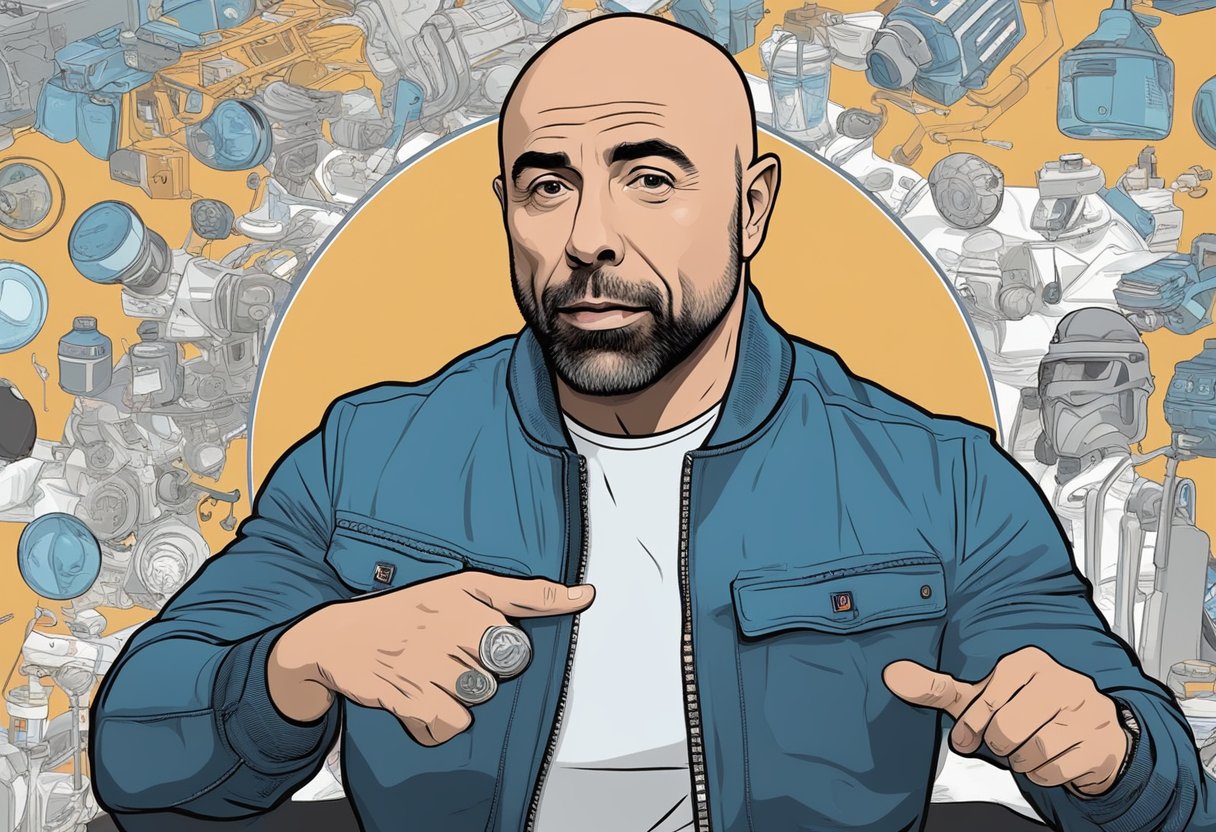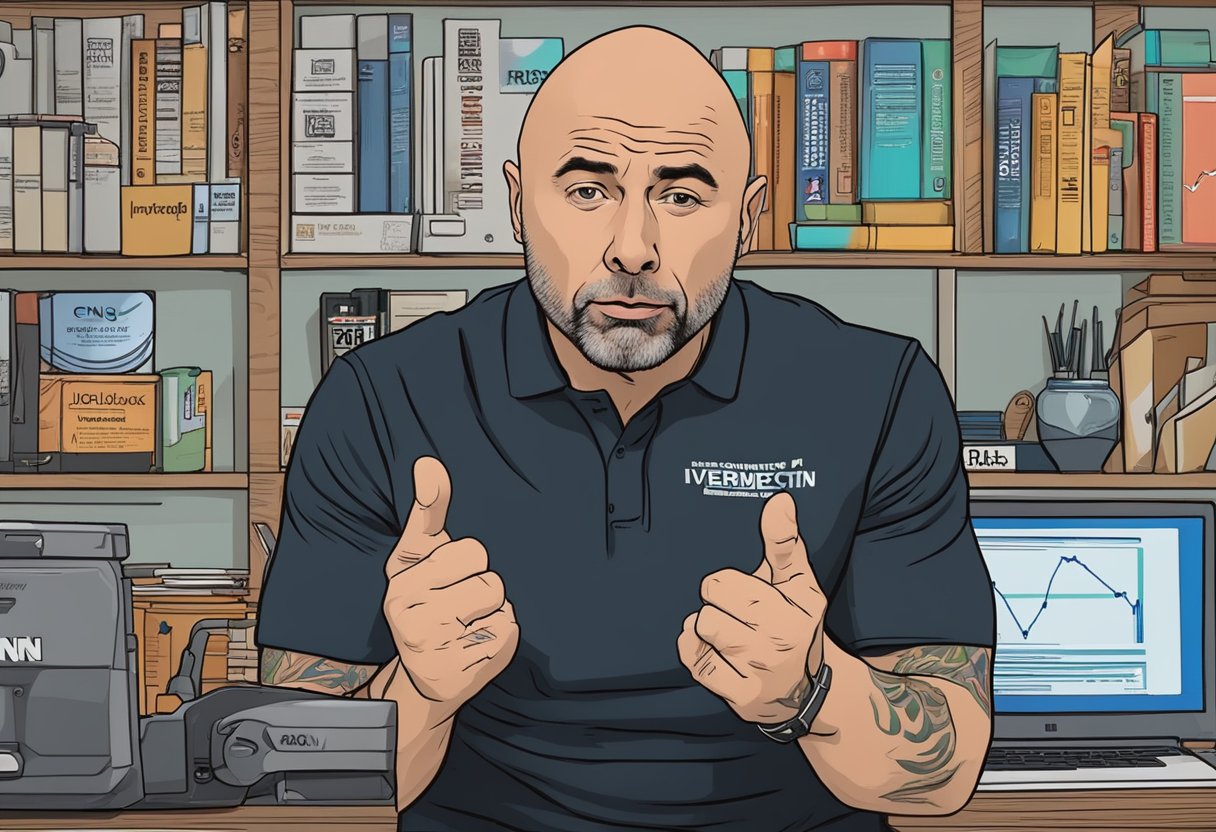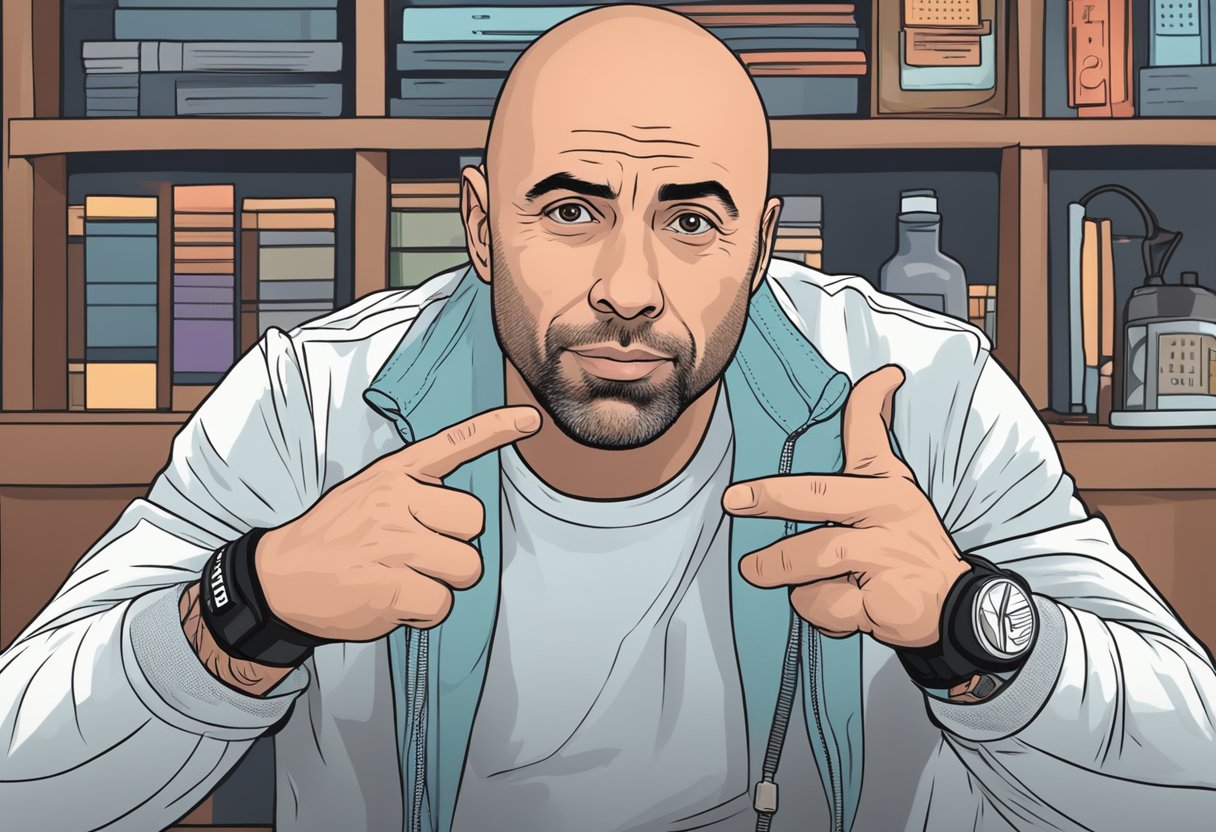Amidst the COVID-19 pandemic, the conversation around treatment options has become a contentious and highly debated subject. High-profile podcast host Joe Rogan found himself at the center of this debate following his announcement that he contracted the virus and his subsequent disclosure of taking ivermectin among other medications as part of his treatment regimen. Ivermectin, a drug typically used to treat parasitic infections, gained widespread attention as a potential treatment for COVID-19, despite the lack of robust clinical evidence supporting its efficacy for this novel virus.

The discourse escalated after CNN's coverage of Rogan's treatment choices, which Rogan discussed openly during his widely-consumed podcast. Ivermectin's use as a COVID-19 treatment became a polarizing issue, intersecting media narratives, medical expertise, and public opinion. The situation intensified as Rogan confronted CNN's medical correspondent, Dr. Sanjay Gupta, during an interview on his podcast, further fueling discussions around media responsibility, medical misinformation, and individual agency within public health discourse.
This intersection prompted broader considerations about the role of regulatory bodies in guiding public health, the potential implications of personal anecdotes becoming highly influential, and the importance of maintaining a clear separation between verified medical guidance and individual treatment decisions during a global health crisis.
Key Takeaways
- Joe Rogan's COVID-19 treatment and discussion on ivermectin spurred media and public scrutiny.
- CNN's portrayal of Rogan's treatment choice highlighted the tension between media and medical accuracy.
- The event underscores the impact of high-profile figures on public health discussions and misinformation.
Joe Rogan's Experience with COVID-19
In August 2021, Joe Rogan announced that he contracted COVID-19, leading to a mix of criticism and support for his chosen treatment regimen. His recovery process was unconventional and included treatments not endorsed by all health experts.
Diagnosis and Initial Treatment
Upon being diagnosed with COVID-19, Joe Rogan promptly started a variety of treatments. He revealed that his regimen included ivermectin, a medicine that has been a topic of controversy for its off-label use to treat COVID-19. Additionally, he took a Vitamin Drip and a Z-Pack, which is a form of azithromycin marketed to treat bacterial infections, in an effort to mitigate his symptoms. To support his body's response to the infection, Rogan also took prednisone, a corticosteroid that can reduce inflammation.
Joe Rogan's COVID-19 Recovery
Rogan's approach to recovery was immersive, as he also used a NAD Drip, a therapy that introduces Nicotinamide Adenine Dinucleotide directly into the bloodstream. This treatment is sometimes touted for its potential restorative benefits. Throughout his recovery process, Rogan updated his audience on the progression of his symptoms and his experience with the disease. Rogan did not only rely on pharmacological interventions, but he also credited rest and medications with helping him recover from COVID-19 within a short period.
Discussion of Ivermectin Use
Ivermectin became a widely discussed topic during the COVID-19 pandemic, particularly regarding its efficacy and safety when used for purposes other than its approved indications.
Medication Background
Ivermectin is a medication traditionally used as an antiparasitic treatment, commonly deployed against conditions caused by roundworms, lice, and other parasites. It serves a critical role in both human and veterinary medicine. In the veterinary context, it is known as a livestock drug and is often referred to as a deworming agent. Ivermectin has approval from the FDA for use in treating specific conditions in humans, such as onchocerciasis (river blindness) and strongyloidiasis, but it is also widely used to treat and control parasites in animals, including horses, where it is sometimes colloquially called a horse dewormer.
- Approved Uses: Treatment of specific parasitic conditions.
- Formats: Oral tablets, topical lotions, and injectables for veterinary use.
Controversies and Misinformation
The discussion surrounding the use of ivermectin intensified when individuals began promoting it as a potential treatment or preventive measure for COVID-19, despite the lack of robust evidence for this use. This led to significant public confusion and concern. The FDA has issued clear guidance on Why You Should Not Use Ivermectin to Treat or Prevent COVID-19, stating that its use in this manner is not supported by evidence and can potentially result in harm if not used according to the label.
Misinformation has been widespread, with some media and personalities acting as distributors of misinformation. One such notable instance involved Joe Rogan, who defended his use of ivermectin against COVID-19, leading to a publicized debate characterized by conflicting narratives from various media outlets. Rogan's situation also prompted discussions about the drug's depiction in the media, particularly the pejorative labeling as a "horse dewormer" even though it has legitimate applications in human medicine. These events highlighted the challenges in addressing public understanding in the context of medical treatments and the role of the media as a potential distributor of misinformation during a health crisis.
- FDA Warning: Against use for COVID-19 due to lack of evidence and potential risks.
- Media Debates: Conflicting reports and discussions in the media complicating public perception.
CNN's Coverage of Joe Rogan's Treatment
CNN's reporting of podcaster Joe Rogan's treatment with Ivermectin became a subject of intense debate and critical analysis by media and viewers alike. This coverage featured prominent CNN personalities and occurred across various network segments.
Erin Burnett's Reporting
Erin Burnett, while covering the story, focused on the controversy surrounding the use of Ivermectin—a medication which is FDA-approved for parasitic infections but also used off-label for other treatments. Burnett scrutinized Rogan's choice of the drug, highlighting the medical community's warnings against its use for COVID-19 outside of clinical trials.
Don Lemon's Commentary
Don Lemon participated in the conversation by commenting on the potential risks of public figures promoting treatments not widely endorsed by the scientific community. CNN, as a news network, amplified Lemon's concerns about the responsibility journalists hold in disseminating accurate medical information to the public.
Sanjay Gupta's Appearance on JRE
Dr. Sanjay Gupta, CNN's chief medical correspondent, made headlines with his appearance on the Joe Rogan Experience (JRE) podcast. During this episode, Joe Rogan confronted Dr. Gupta about CNN's portrayal of his treatment regimen. This encounter provided both parties a platform to discuss the nuances of media coverage and journalistic integrity within the context of a highly polarized issue.
The Intersection of Media, Medicine, and Misinformation
The Joe Rogan and CNN clash over ivermectin spotlights the complex interactions between media representation, medical expertise, and the spread of information. This mosaic of perspectives shapes public discourse on health discussions.
The Role of Doctors and Medical Analysts
Doctors and medical analysts like Dr. Sanjay Gupta play a pivotal role in informing the public about health issues. These professionals can lend credibility to discussions, such as those around ivermectin and alternative treatments. When Joe Rogan engaged CNN's chief medical correspondent, it highlighted how influential these figures are in challenging or reinforcing narratives within the media.
Social Media's Influence on Public Opinion
Social Media platforms magnify the reach and impact of conversations, including those related to health and medicine. A podcast like Joe Rogan's can rapidly disseminate a perspective, swaying public opinion. This spreading of information, whether accurate or not, often transforms debates over internet-prescribed drugs or critiques of an American company into viral phenomena.
Ivermectin and Alternative Treatments in the Media
In the media, reports on ivermectin as a potential COVID-19 treatment led to contentious debates. Some physicians, like Dr. Jonathan Reiner, have opposed using it for COVID-19, stressing the lack of evidence for its effectiveness. Coverage of this contrasts with instances of misinformation and the impacts of promoting folk remedies or conspiracy theories by anti-vax persons. Regardless of stance, the media’s role in framing discussions of alternative treatments demands careful consideration to avoid endorsing unproven or harmful substances.
Broader Implications and Debates

The controversies surrounding Joe Rogan, Ivermectin, and CNN have sparked wider debates about the impact of influential media personalities on public health discussions and the dissemination of health-related information.
Covid-19 Vaccination Discourse
The discourse around COVID-19 vaccines has been varied and, at times, heated. Joe Rogan's discussions around alternative treatments for COVID-19, including Ivermectin, have influenced public opinion. His platform, The Joe Rogan Experience, is a popular podcast distributed by Spotify and reaches millions, which indicates its significant impact on the topics of vaccines and vaccinations. This has led to intense dialogues on Twitter and other platforms about the responsibility of media figures in shaping the public's approach to vaccination during a pandemic.
The Role of Podcasts in Disseminating Information
Podcasts like The Joe Rogan Experience play a considerable role in how information is shared and consumed. The podcast’s reach shows that many listeners value the platform for its discussions, potentially affecting their perceptions and decisions about health practices. The advent of this medium challenges traditional media outlets, such as CNN, in influencing public opinion. As these platforms continue to grow, they bring to the fore the importance of accurate information sharing and the need for critical evaluation of the content by listeners.
Regulatory Perspectives and Public Health

In the context of the COVID-19 pandemic, regulatory bodies like the Food and Drug Administration (FDA) and the Centers for Disease Control and Prevention (CDC) have played critical roles in guiding the use of medications and public health responses. Their stances on various medical treatments, including those for COVID-19, are essential for safe and effective disease management.
FDA and CDC Stance on Medications
The FDA and CDC have consistently emphasized the importance of using medications that are scientifically validated and approved for treating COVID-19. The FDA, responsible for the evaluation and approval of drugs, has granted emergency use authorizations (EUAs) to certain medical treatments such as monoclonal antibodies for COVID-19. These antibodies are specifically designed to target the coronavirus, helping prevent severe illness. In contrast, drugs like ivermectin, a medication typically used to treat parasitic diseases in livestock, have not been approved for COVID-19 treatment. The FDA warned against its use, stating that it is a veterinary drug considered unsafe and ineffective for treating the virus causing the pandemic.
Approved COVID Treatments:
- Emergency use authorization for monoclonal antibodies.
- Vaccines authorized for preventing COVID-19.
Unapproved Treatments for COVID-19:
- Ivermectin, commonly used for horse worm and other parasitic diseases in animals.
- Other veterinary drugs not authorized for human coronavirus treatment.
Deconstructing the 'Kitchen Sink' Approach to Treatment
Throughout the U.S. and globally, there has been a tendency for some to advocate for a 'kitchen sink' approach to treating COVID-19, especially early in the pandemic when treatment options were limited. This approach entails throwing a multitude of therapies at the patient in the hope something will work. However, this strategy is not without risks, and health authorities stress the need for evidence-based treatments. The FDA has underscored the danger of using unsanctioned drugs like ivermectin, which won a Nobel Prize for its human applications against certain parasitic diseases, but is not intended for COVID-19 treatment. Utilizing it without medical supervision could lead to dangerous side effects, and may detract from the use of established protocols, including authorized antiviral medications and vaccines that are part of an evidence-based regimen for combating the coronavirus.
- Risks of Unapproved Treatments:
- Potential for serious side effects.
- Diversion from evidence-based therapies.
Personal Outcomes and Anecdotes

Personal experiences and responses have played a significant role in shaping the narrative around Joe Rogan's controversial use of ivermectin following his COVID-19 diagnosis. These have taken the form of firsthand accounts on the Joe Rogan Experience podcast, as well as reactions from various public figures.
Joe Rogan's Personal Statements
When Joe Rogan announced on Instagram that he had contracted COVID-19, he also mentioned a treatment regimen that included the drug ivermectin, which is commonly used as an antiparasitic medication. This disclosure led to widespread discussion and the term "Horse Worm Rogan" being used by some to describe his decision. On the Joe Rogan Experience podcast, Rogan provided details of his treatment and recovery process, asserting his recovery was swift and attributing it, at least in part, to his use of ivermectin along with other treatments.
Public Figures' Responses
Subsequently, reactions from public figures varied greatly. Comedian Tom Segura discussed the use of ivermectin on his own podcast, contributing to the public discourse. In the media, Anderson Cooper and others at CNN were critical of Rogan's choice to use ivermectin, which is not an FDA-approved treatment for COVID-19, prompting discussions about the drug's efficacy and safety. These responses contributed to a diverse range of opinions making up public opinion on the matter, often reflecting broader debates on medical treatments for COVID-19.
Future Considerations

The section considers the trajectory of medical treatments and media's role in shaping public opinion during health crises, particularly in the context of Joe Rogan's ivermectin use and CNN's reporting on the matter.
Evolving Treatments and Public Perception
During the COVID pandemic, treatments have varied, from vaccines to antivirals, and even, controversially, drugs like ivermectin—originally used for deworming livestock and treating parasitic worms, head lice, and skin conditions. While some have advocated for ivermectin as a treatment for COVID, citing anecdotal success, mainstream medical authorities have generally not supported its use for this purpose due to a lack of sufficient evidence. The dosage of ivermectin intended for humans differs from that used for animals, highlighting the potential dangers of misuse.
- Evolution of public perception:
- Positive initial hope for new treatments
- Concern over misuse and misinformation
Journalistic Responsibility and Health Narratives
Health crises spotlight the need for responsible reporting. Through the case of Joe Rogan and CNN, the weight of journalistic integrity becomes apparent—news outlets must balance between reporting breakthroughs and underscoring the scientifically vetted information. When discussing treatments such as ivermectin, the potential benefits must be weighed against the risks of encouraging unproven or potentially dangerous regimens. Accurate media depiction is crucial, as public health narratives can lead to widespread acceptance or skepticism of medical advice.
- Imperatives for journalism in health crises:
- Provide accurate and thorough diagnosis and treatment information without sensationalism
- Distinguish between human and veterinary interpretations of dose and application
These considerations have lasting implications beyond any single event, shaping future medical discourse and public trust in both healthcare and media reporting.
Conclusion

Joe Rogan, the host of "The Joe Rogan Experience" podcast, publicly questioned CNN's coverage of his COVID-19 treatment, which included the use of Ivermectin. This drug, which has applications for both humans and animals, became a controversial topic during the pandemic. CNN reported on Rogan's choice of treatment in a manner that Rogan felt misrepresented its use and led to a widely viewed tense exchange with CNN's chief medical correspondent, Dr. Sanjay Gupta.
The network's reporting on this medication, particularly in relation to Rogan's treatment, was critiqued for being potentially misleading. CNN later issued a statement, which can be interpreted as a defense of their coverage. The interactions and the ensuing dialogue highlighted the polarized opinions surrounding COVID-19 treatments and mainstream media reporting.
Rogan's approach to his COVID-19 infection and subsequent recovery amplified the conversation about alternative treatments. It showcased the influence podcasting can wield in public discourse and its ability to challenge mainstream narratives.
It is clear from the various viewpoints and discussions that the Joe Rogan and CNN situation is more than an isolated incident; it reflects wider conversations and debates on media representation and medical treatment during the COVID-19 era.
Frequently Asked Questions

In this section, readers will find answers to common questions about the contention between Joe Rogan and CNN regarding his COVID-19 treatment, the network's response, and the specifics of the medications used.
What controversy arose between Joe Rogan and CNN regarding COVID-19 treatment?
Joe Rogan became embroiled in controversy with CNN when he disclosed his use of various treatments, including ivermectin, after testing positive for COVID-19. His approach drew criticism from some medical professionals and was the subject of heated discussions in the media.
How did CNN respond to allegations over their coverage of Joe Rogan's COVID-19 treatment choices?
CNN defended their coverage of Joe Rogan's COVID-19 treatment choices amidst allegations that they misrepresented his use of ivermectin. The network discussed this during an amicable but occasionally tense interview with Rogan.
Which medication did Joe Rogan take that prompted discussion and controversy on CNN?
The medication at the heart of the discussion was ivermectin, an FDA-approved drug typically used to treat parasitic worms, head lice, and skin conditions such as rosacea. Ivermectin became controversial due to off-label use to treat COVID-19, which has not been approved by health authorities.
On which episode of Joe Rogan's podcast did Sanjay Gupta appear as a guest?
Dr. Sanjay Gupta, CNN's chief medical correspondent, appeared as a guest on an episode of Joe Rogan's podcast, where they discussed COVID-19, vaccines, and medical misinformation.
What statements has Joe Rogan made about his COVID-19 treatment and media coverage?
Joe Rogan discussed his COVID-19 treatment, defending his decision to include ivermectin as part of his approach, and criticized some media outlets, particularly CNN, for how they reported on his choices, implying they misrepresented his treatment.
Has CNN issued any retractions or clarifications regarding their reporting on Joe Rogan?
There are no indications of formal retractions from CNN regarding their reporting on Joe Rogan's COVID-19 treatment. However, they have defended their coverage explaining their position on the matter and responding to the critiques leveled against them.
